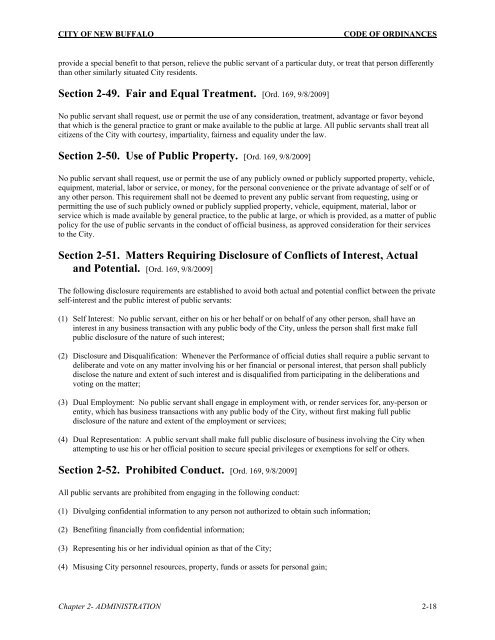General Ordinances - City of New Buffalo
General Ordinances - City of New Buffalo
General Ordinances - City of New Buffalo
You also want an ePaper? Increase the reach of your titles
YUMPU automatically turns print PDFs into web optimized ePapers that Google loves.
CITY OF NEW BUFFALO<br />
CODE OF ORDINANCES<br />
provide a special benefit to that person, relieve the public servant <strong>of</strong> a particular duty, or treat that person differently<br />
than other similarly situated <strong>City</strong> residents.<br />
Section 2-49. Fair and Equal Treatment. [Ord. 169, 9/8/2009]<br />
No public servant shall request, use or permit the use <strong>of</strong> any consideration, treatment, advantage or favor beyond<br />
that which is the general practice to grant or make available to the public at large. All public servants shall treat all<br />
citizens <strong>of</strong> the <strong>City</strong> with courtesy, impartiality, fairness and equality under the law.<br />
Section 2-50. Use <strong>of</strong> Public Property. [Ord. 169, 9/8/2009]<br />
No public servant shall request, use or permit the use <strong>of</strong> any publicly owned or publicly supported property, vehicle,<br />
equipment, material, labor or service, or money, for the personal convenience or the private advantage <strong>of</strong> self or <strong>of</strong><br />
any other person. This requirement shall not be deemed to prevent any public servant from requesting, using or<br />
permitting the use <strong>of</strong> such publicly owned or publicly supplied property, vehicle, equipment, material, labor or<br />
service which is made available by general practice, to the public at large, or which is provided, as a matter <strong>of</strong> public<br />
policy for the use <strong>of</strong> public servants in the conduct <strong>of</strong> <strong>of</strong>ficial business, as approved consideration for their services<br />
to the <strong>City</strong>.<br />
Section 2-51. Matters Requiring Disclosure <strong>of</strong> Conflicts <strong>of</strong> Interest, Actual<br />
and Potential. [Ord. 169, 9/8/2009]<br />
The following disclosure requirements are established to avoid both actual and potential conflict between the private<br />
self-interest and the public interest <strong>of</strong> public servants:<br />
(1) Self Interest: No public servant, either on his or her behalf or on behalf <strong>of</strong> any other person, shall have an<br />
interest in any business transaction with any public body <strong>of</strong> the <strong>City</strong>, unless the person shall first make full<br />
public disclosure <strong>of</strong> the nature <strong>of</strong> such interest;<br />
(2) Disclosure and Disqualification: Whenever the Performance <strong>of</strong> <strong>of</strong>ficial duties shall require a public servant to<br />
deliberate and vote on any matter involving his or her financial or personal interest, that person shall publicly<br />
disclose the nature and extent <strong>of</strong> such interest and is disqualified from participating in the deliberations and<br />
voting on the matter;<br />
(3) Dual Employment: No public servant shall engage in employment with, or render services for, any-person or<br />
entity, which has business transactions with any public body <strong>of</strong> the <strong>City</strong>, without first making full public<br />
disclosure <strong>of</strong> the nature and extent <strong>of</strong> the employment or services;<br />
(4) Dual Representation: A public servant shall make full public disclosure <strong>of</strong> business involving the <strong>City</strong> when<br />
attempting to use his or her <strong>of</strong>ficial position to secure special privileges or exemptions for self or others.<br />
Section 2-52. Prohibited Conduct. [Ord. 169, 9/8/2009]<br />
All public servants are prohibited from engaging in the following conduct:<br />
(1) Divulging confidential information to any person not authorized to obtain such information;<br />
(2) Benefiting financially from confidential information;<br />
(3) Representing his or her individual opinion as that <strong>of</strong> the <strong>City</strong>;<br />
(4) Misusing <strong>City</strong> personnel resources, property, funds or assets for personal gain;<br />
Chapter 2- ADMINISTRATION 2-18



